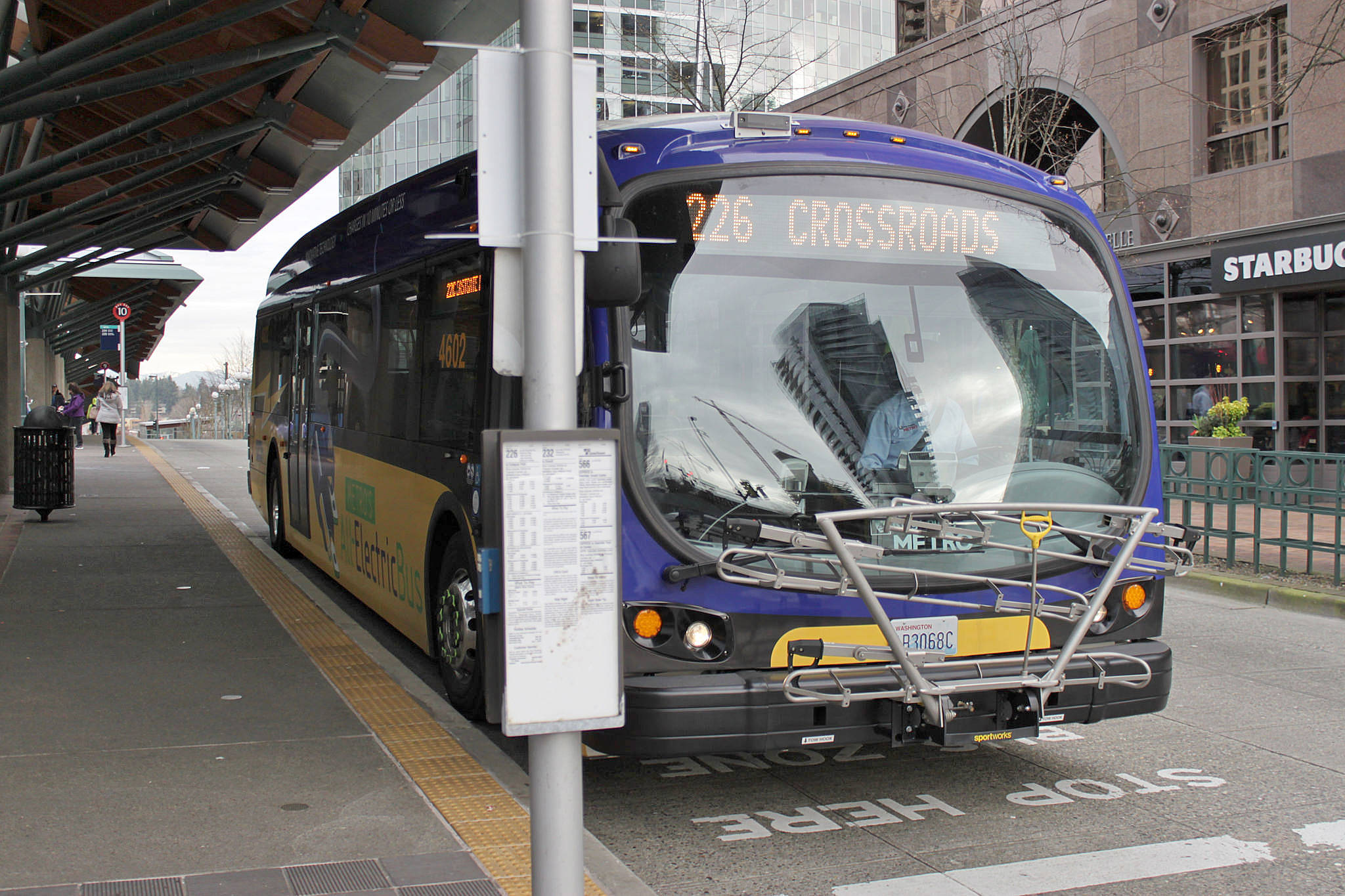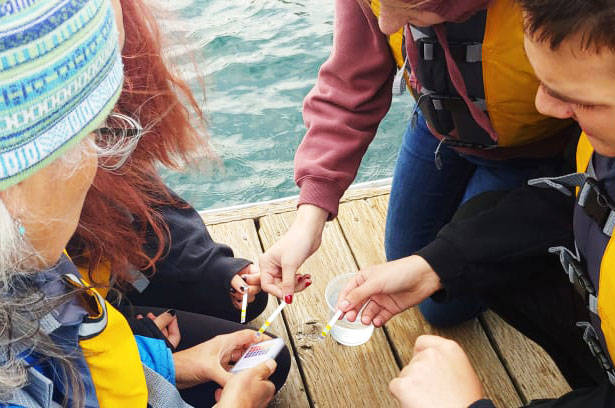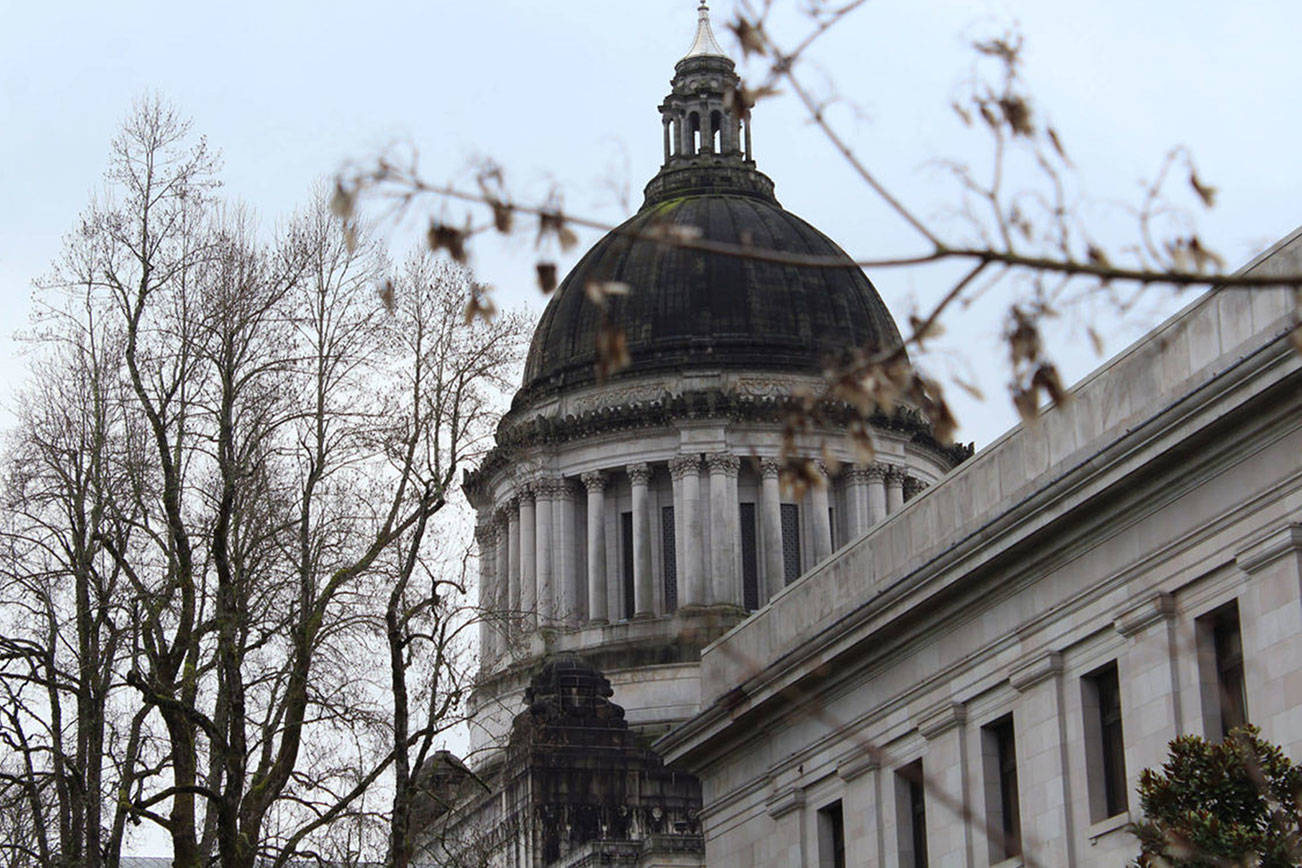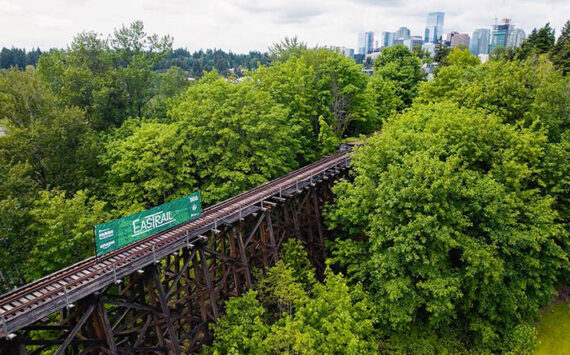• King County Metro Transit will begin testing long-range, battery-powered buses that can travel more than 140 miles on a single charge.
The buses will be tested on longer routes that include steep hills. If the test is successful, the buses could be used on around 70 percent of Metro’s bus routes.
As part of the test, various manufacturers will provide 40- and 60-foot battery powered buses for the performance test. The county will be testing buses before selecting a manufacturer to contract with. The test is part of Metro’s plan to deploy new zero-emissions busses in South King county as well as operating a no-emissions fleet by 2040. Part of this includes purchasing and using green buses as well as installing a high-powered charging station at a base facility. One station is based on the Eastside in Bellevue.
The announcement also follows a report on the environmental benefits of electric buses, which was released this summer by the Environment Washington Research and Policy Center. The release said buses cost less to maintain and can travel four times the distance per gallon than diesel-fueled buses.
This means that a full transition to electric buses in Washington state could avoid nearly 90,000 tons of pollution each year, equivalent to taking more than 17,000 cars off the road. The county plans on purchasing 120 all-electric buses by 2020 in an effort to meet its 2040 goals. The county’s fleet includes roughly 1,400 buses, many of which are hybrids that rely on diesel and electricity.
In previous coverage, the Seattle Weekly found that due to declines in electric vehicle battery costs and improvements in quality, governments using electric buses saved around $30,000 per bus each year compared to diesel-powered buses.
The report also said that exhaust from diesel-powered buses can cause breathing problems and worsen diseases like asthma. Diesel buses can include benzene and formaldehyde.
Additionally, a 2017 report found that King County Metro buses consumed around 10 million gallons of diesel annually and accounted for 80 percent of emissions from the county government. — Aaron Kunkler, Seattle Weekly
• Jeff Zirkle of Bonney Lake promised customers that his company, Total Reclaim, would safely and responsibly recycle millions of pounds of electronics inside the Unites States.
Instead, Zirkle, 55, and his Seattle-area business partner Craig Lorch, 61, secretly shipped those electronics to Hong Kong while taking money from public agencies, according to a Department of Justice. On Nov. 16, the two men pleaded guilty in the U.S. District Court in Seattle to conspiracy to commit wire fraud, which is punishable by up to five years in prison and a $250,000 fine. Additionally, Zirkle and Lorch agreed to pay restitution of up to $1.1 million.
Total Reclaim has a long history in Washington. According to its website, the company was created to help government agencies and other industries recycle refrigerators and HVAC equipment in light of the amendments made to the 1990 Clean Air Act.
Since then, the company became the Pacific Northwest’s largest electronic waste recycler as well as the biggest participant in Washington state’s “E-Cycle Washington” program, which allows people to drop their old electronics off at designated sites to be given to electronic recycling companies, the Justice Department stated. According to Total Reclaim’s website, the company has recycled more than 536 million pounds, and counting, of e-waste.
Total Reclaim’s customers include the city of Seattle, the University of Washington, and its biggest customer, the Washington Materials Management and Financing Authority.
A sentencing hearing is scheduled for Feb. 1, 2019, but is likely to be moved further into the future, the United State’s Attorney’s Office in Seattle said.
In addition to what the court will levy against Zirkle and Lorch in terms of fines and jail time, and the $1.1 million the two men agreed to pay back, Washington’s Department of Ecology fined Total Reclaim $444,000 in 2016 for shipping the LCD monitors overseas, as well as $67,500 in 2017 for illegally storing the monitors on Harbor Island. — The Courier-Herald
• The city of Kent will add 11 red-light cameras next year at six major intersections in an effort to catch drivers who run the lights — and raise revenue to purchase body cameras for police officers.
Kent’s first red-light cameras could bring in an estimated $1 million to $2 million per year in revenue. A Kent City Council committee also approved a five-year contract with Arizona-based American Traffic Solutions (ATS) Inc. for as much as $651,000 per year for camera installation and maintenance along with the processing and mailing of infractions.
Drivers will be fined $124 for running a red light. Police Chief Rafael Padilla said the system will be operating in about six to eight months. Crews will install cameras at intersections based on where the most collisions have occurred. — Kent Reporter
• Engineers and workers gathered in a conference room at Redmond’s Aerojet Rocketdyne facility on Nov. 26 to watch as NASA’s InSight lander gently touched down on Mars, thanks to the rockets they manufactured.
Aerojet’s Redmond campus designs, tests and manufactures thrusters and rockets used in NASA, Boeing and Lockheed Martin spacecrafts — which help launch, guide and land the vehicles. The company has been in Redmond for 50 years and has been part of all eight successful NASA Mars missions. It employs more than 400 people in Redmond and has produced more than 20,000 rocket engines and thrusters.
“The path to Mars goes through Redmond,” said Aerojet’s general manager Ken Young at the Monday livestream viewing.
The InSight started its descent around 11:42 a.m. West Coast time and reached its peak heat heading into the Martian atmosphere around 11:48 a.m. During entry, the lander’s heat shields can reach up to 3,000 degrees Fahrenheit. A few minutes later at 11:54 a.m., the NASA livestream announced the lander had successfully landed on Mars. The room erupted in cheers and applause. — Redmond Reporter








